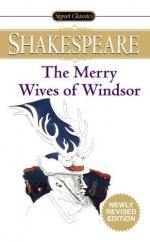|
This section contains 11,175 words (approx. 38 pages at 300 words per page) |

|
SOURCE: “Shakespeare's Merry Wives and the Law of Fraudulent Conveyance,” in Renaissance Drama, n.s., XXV, 1994, pp. 145-69.
In the following essay, originally presented in 1992, Ross examines the fraudulent practices that occur in The Merry Wives of Windsor, which center principally but not exclusively around Falstaff, and argues that the ambivalent outcomes of these practices reflect the ambiguous morals of Renaissance society.
Several forms of fraudulent conveyance characterize Shakespeare's Merry Wives of Windsor:1 Fraudulent conveyance may be defined as putting realizable assets beyond [a] creditor's process, whatever form that process might take” (Glenn 2). Laws against such transfers of assets occur in every society that recognizes the obligation to pay debts. The flip side is that civil societies have a certain tolerance for people who devise means to avoid the clutches of creditors.
The concept of fraudulent conveyance was found in Roman law;2 it arose in canon law, where...
|
This section contains 11,175 words (approx. 38 pages at 300 words per page) |

|


